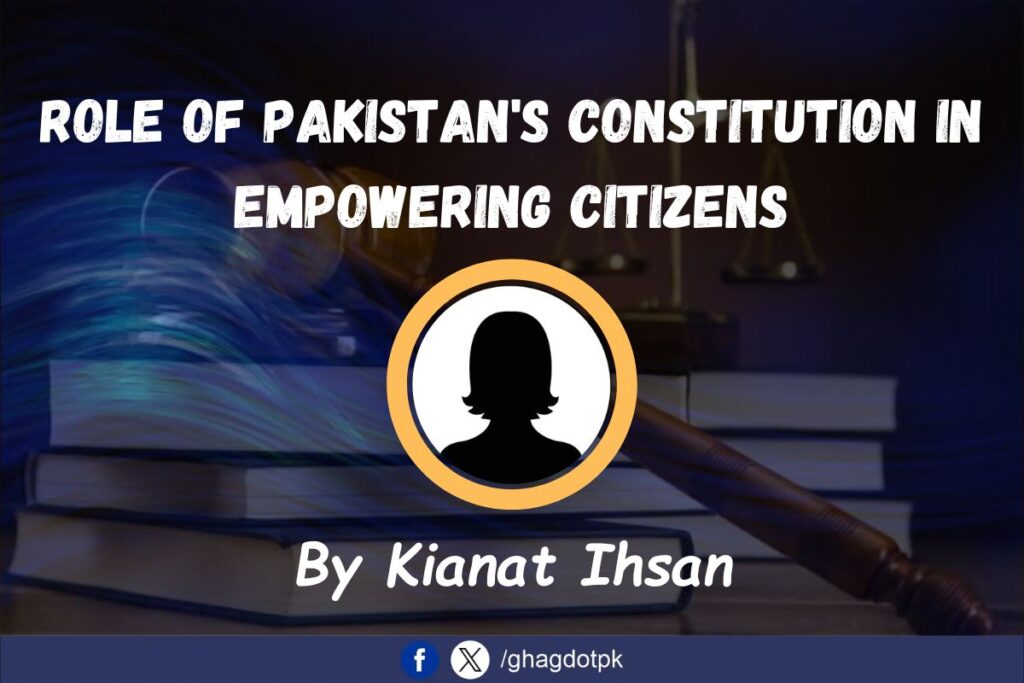By Kainat Ihsan
The Constitution of Pakistan is the cornerstone of the nation’s democracy and the foundation upon which the rights and freedoms of its citizens are built. Enacted in 1973, it outlines a framework that not only governs the structure of the state but also enshrines fundamental rights that empower individuals to participate meaningfully in the democratic process. Through its various articles and provisions, the Constitution promotes principles such as freedom of expression, equality before the law, and the right to participate in governance, thereby strengthening the role of citizens in a democratic society.
One of the most significant aspects of the Constitution is its explicit commitment to fundamental rights. Articles 8 to 28 guarantee a range of civil liberties, including the right to life, liberty, and security; freedom of speech; and the right to a fair trial. These rights are essential for empowering citizens, as they provide individuals with the necessary protections to express their views, seek justice, and hold the government accountable for its actions. By ensuring that these rights are protected, the Constitution allows citizens to engage in public discourse, advocate for their interests, and challenge abuses of power.
Article 19 of the Constitution specifically safeguards the right to freedom of expression, which is vital for a thriving democracy. This provision allows citizens to voice their opinions, share information, and engage in political debates without fear of censorship or retaliation. A robust freedom of expression not only enables citizens to participate in governance but also fosters an environment where diverse perspectives can be heard and considered. This diversity of thought is crucial for informed decision-making and policy formulation.
Moreover, the Constitution emphasizes the principle of equality, as enshrined in Article 25, which states that all citizens are equal before the law and are entitled to equal protection. This fundamental right empowers marginalized and disadvantaged groups, ensuring that they have access to the same legal protections and opportunities as others. By promoting equality, the Constitution encourages social justice and enables all citizens to participate in the democratic process, regardless of their background, gender, or socio-economic status.
The Constitution also establishes mechanisms for citizen participation in governance. Through provisions for free and fair elections, it empowers citizens to choose their representatives and hold them accountable. This electoral framework is vital for ensuring that the government reflects the will of the people and that citizens have a direct role in shaping policies that affect their lives. The right to vote is a powerful tool that enables citizens to influence government decisions and advocate for change in their communities.
Furthermore, the Constitution creates independent institutions, such as the judiciary and various commissions, to protect citizens’ rights and uphold the rule of law. These institutions serve as checks on government power and provide avenues for individuals to seek justice when their rights are violated. By ensuring that citizens can turn to these bodies for redress, the Constitution empowers them to challenge injustices and demand accountability from public officials.
In addition to these rights and mechanisms, the Constitution of Pakistan enshrines the principle of public participation in governance. It encourages citizens to engage with their government and contribute to the policymaking process. This principle not only enhances transparency but also fosters a sense of ownership among citizens regarding the decisions that affect their lives. When citizens are involved in governance, they are more likely to advocate for their rights and work towards the betterment of their communities.
In conclusion, the Constitution of Pakistan is a vital instrument for empowering citizens. By enshrining fundamental rights, promoting equality, ensuring freedom of expression, and providing mechanisms for participation, the Constitution creates an environment where individuals can actively engage in governance and hold their government accountable. As citizens become more aware of their constitutional rights and assert their voices, they play a crucial role in strengthening democracy and promoting good governance in Pakistan. The Constitution not only serves as a legal framework but also as a beacon of hope for a more just and equitable society, empowering citizens to pursue their rights and advocate for their interests.






